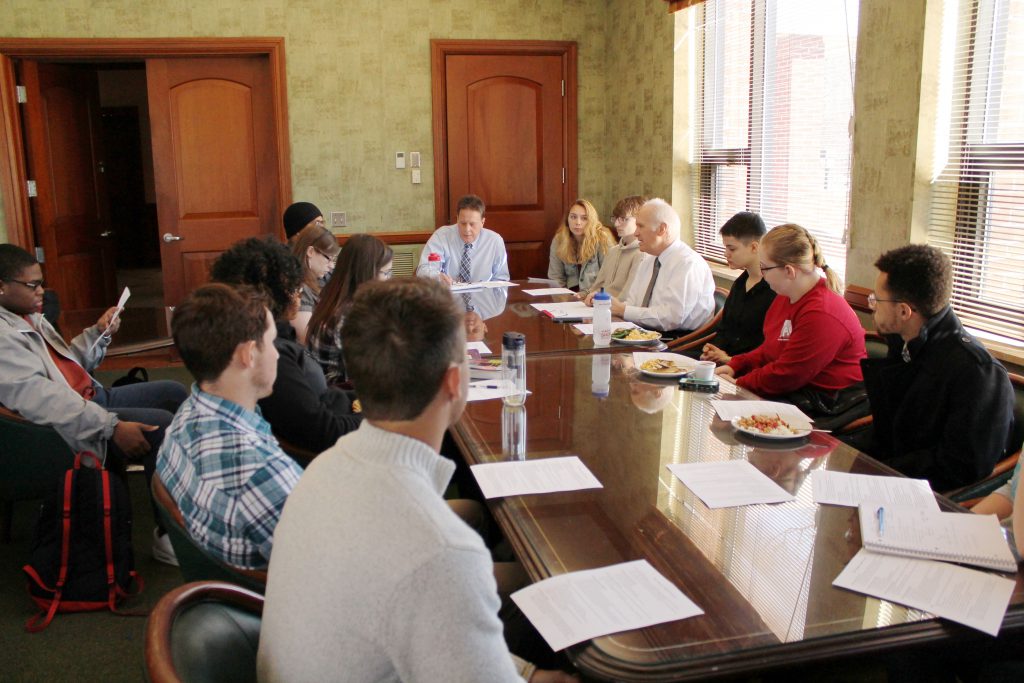

Featured Image: Information from www.vwu.edu shows student retention rate statistics. Lily Reslink | Marlin Chronicle
Faculty and students have opposing opinions on how the grant of $1,921,806.41 that Virginia Wesleyan University received should be allocated over the next five years.
The Strengthening Institutions Program grant was awarded by the Department of Education, and its eligibility requires a large student population of low-income and first-generation students. The university plans to use these funds to support these groups of students, as well as the entire student body.
To achieve this, administration created the “Bridging, Connecting, and Building Student Success” program (BCB), which plans to construct a college environment that allows growth and success, while improving graduation and retention rates.
In hopes of strategically approaching student retention, a portion of the grant money will be dedicated to data collection and the new software in place to achieve this. They will collect this data from the Oracle Student Management System.
Oracle Technology is already implemented within Virginia Wesleyan in the software of the Human Resources and Finance departments, but this company is engineering the Oracle Student Management Program for the university in addition.
One proponent of this program is designed for faculty to better assess student’s academic performance. Administrators will use academic data to identify students who are struggling, and contact advisors or counseling services to improve the college experience for the individual student.
The other objective of the software is to create an easier advising session for students. This will serve as a new WebAdvisor for the student body, and combine the handbook information and registration process. This means students will be able to see when classes are offered on the same program that they sign up for them.
Dr. Loren Loving Marquez, the associate vice president of Academic Affairs, spoke on the topic of registration. “Students will have a map in front of them,” Marquez said, which will make registration less tedious.
This grant will also work to expand on current practices. The university will add extra tutoring services to assist students with coursework and additional faculty to regulate these tutors.
As part of the plan, the grant will provide funds for supplemental counseling staff to offer emotional support in conjunction with the Learning Center, creating a split-time position between the two. This means a counselor will be in the Learning Center to assist with students while they are studying or testing, as well as working in the Counseling Center in the Batten Student Center.
The end goal in the Bridging, Connecting, and Building Student Success plan is to improve retention and graduation rates. According to the Virginia Wesleyan University website, the current retention rate for first to second year students is 62%, and the graduation rate totals 48%. This leaves room for substantial improvement.
The BCB plan was submitted within the application for the grant. This means that under contract, Virginia Wesleyan is required to use these funds for the purposes described. This does not stop students from having critiques on how the university plans to use the funds.
Students feel that it is important for the university to increase retention and graduation rates, and they agree with portions of the plan. However, some have voiced that they think administrators missed the mark on effectively increasing these rates.
In regard to the plan set by the university, Jessica Wilson, a junior and the Co-Lead in the Intentional Endowments Network, said, “One of the first steps is to address existing problems with retention, for example the mold in the housing. It’s hard to improve when you don’t have that groundwork.”
According to Wilson, the university may be misidentifying the factors that lead to students leaving. She suggested that the university focuses on the first issues the students face, such as housing complications, and not strictly rely on data for improvement ideas.
“It’s investing money in data research, and I’m wondering if that’s the best way to go about it,” she said.
The software may also be seen as restricting the student’s well-being to their grades, which are not often the best indicator that a student is struggling. While many students who experience mental health issues may reflect that in their academic performance, others learn to adapt and excel in classes while struggling.
Wilson spoke on this topic. “I feel like grades are not representative of the experience that the student is having,” Wilson said.
Edward McDonald, senior and Student Government Association president, said, “I already see some kinks in the system, especially when you are relying on an algorithm.”
Finances are also a large issue that causes students to transfer. While Work-and-Learn services are offered currently, sometimes these are not enough for students to manage with increasing housing costs.
Ashton Dodrill, a student who attended VWU for his first year and then left the university, said, “One of the biggest reasons why I left VWU is because I couldn’t afford it. I had to work all the time in order to pay for my schooling. It was a struggle to keep my grades up and just enjoy myself,” Dodrill said.
Students have expressed that they want better representation of their needs in the financial decisions that Virginia Wesleyan makes.
“Administrators make really good choices,” McDonald said, “but I think including the student perspective would help with communication and perception issues that they have with the student body.”
Have your voice heard on campus issues by connecting with SGA representatives.
By Kara Hopkins

